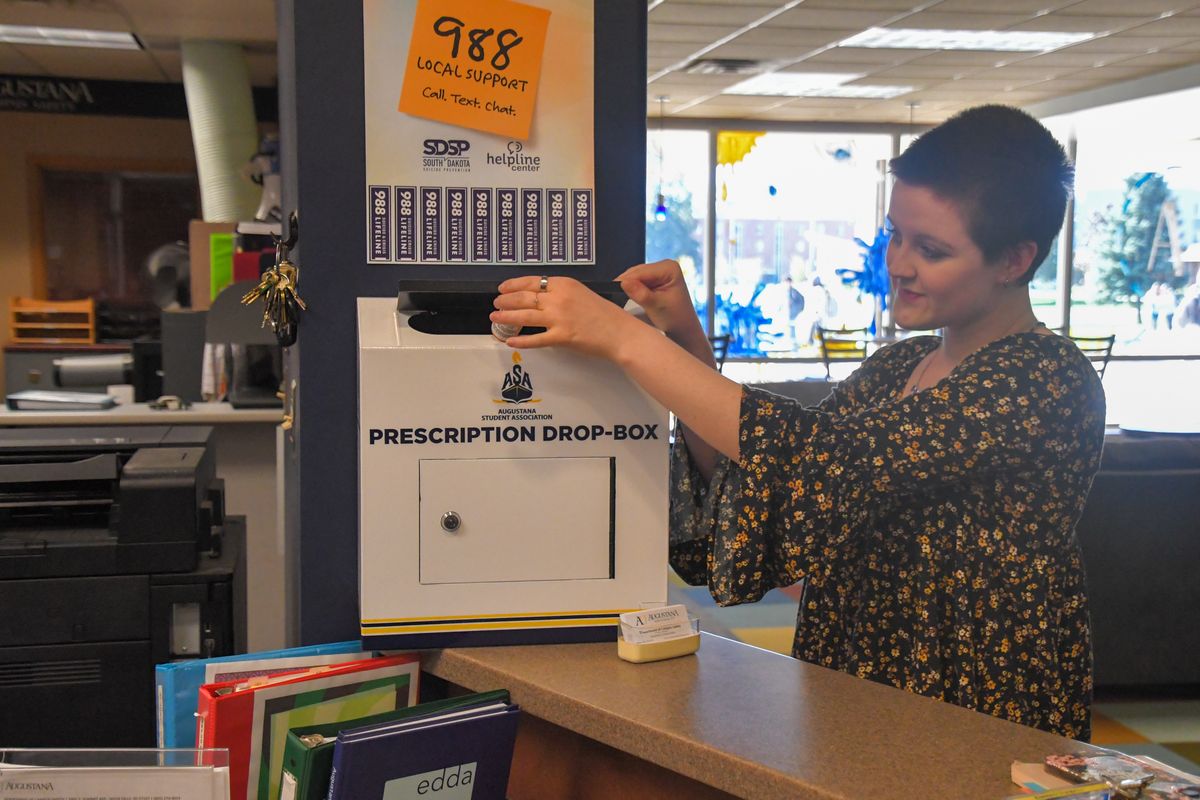Prescription drop-box emphasizes mental health awareness

This story contains content about suicide and addiction. If you or someone you know is in an emotional crisis, reach out to the National Suicide & Crisis Lifeline by dialing or texting 988.
The Augustana Student Association and Campus Safety partnered to install a prescription drop-box in the Morrison Commons earlier this spring. Those responsible for the box hope it will serve as a resource for suicide prevention and help limit opportunities for substance abuse on campus.
Students can use the drop-box to dispose of anything from old over-the-counter drugs to prescriptions that are no longer being taken. Use of the box is anonymous and students do not need to fill out any paperwork or provide any information to the officers.
Em Powers, a sophomore ASA senator, was first inspired to find a way to address medication-related suicide when they served as the chair of the wellbeing committee during J-term in 2023. They observed that the Sioux Falls Police Department, Lewis Drug and several other pharmacies in town all have similar boxes.
“So many people have medicine in their rooms, not always knowing what to do with extras, expired or leftover, and it’s just not a good idea to leave medication around,” Powers said. “If you throw it into a trash can, someone could take it out of there. Even flushing isn’t always a good idea because [though] some medications can be flushed… it's just not a good idea to put medicine into our water system.”
Powers worked with Rick Tupper, associate vice president of Campus Safety and logistics, to decide the best location for the drop-box. They chose the Campus Safety desk because of its accessibility and high-traffic location.
“We looked at the Commons desk being accessible 24 hours a day, a place that’s monitored, so we decided that that was the best place for it to go,” Tupper said.
The box was installed toward the end of the previous school year, but Powers began marketing it this fall. Posters regarding what can and cannot be placed in the drop-box were also recently hung nearby.
“We can’t do needles and we can’t do inhalers, but anything, like if you have meds for your dogs, over-the-counter meds, if you have regular prescriptions, can go in there,” Powers said. “So it’s just a clear little list of what we can do.”
Tupper said from a suicide prevention and addiction standpoint, the drop-box is a good resource because it limits the availability of drugs on campus.
“A lot of times, suicide is an opportunity when you’re at your weakest moments if you have [dangerous substances] available,” Tupper said. “The medications that we’re seeing are highly addictive and whether you use them for pain relief or other medical issues, at some point, you have to be able to break that cycle.”
Tupper said that medications left in the drop-box will be transferred to and handled by a private company north of Sioux Falls as deposits come in.
“What we would tell people is that actually all of these medications have a purpose,” Tupper said. “But once the purpose is over, you get rid of them. Don’t just keep it in your room. Obviously, you can’t give it to other people. This gives you the outlet to get rid of that so that it’s not always there.”
Mental Health and Wellness Specialist Angie Hummel said the prescription drop-box is not only a good thing but necessary, as it will help normalize mental health struggles on campus. She advocates further for community-wide, systematic approaches to suicide prevention.
“Having someone else acknowledge that what they’re experiencing is what they’re experiencing, [people struggling with suicidality] can’t hide and further generate more [loneliness] and hopelessness around the situation,” Hummel said. “Being proactive is demonstrated to be an effective strategy in prevention.”
According to Hummel, the population characteristics of a college campus make for unique challenges regarding suicide prevention.
Most of the Augustana community falls under the age category of “late adolescence,” a period during which a number of mental health conditions emerge, according to Hummel. She said being unaware of mental health disorders, combined with major life changes, occurs in many college-aged students and results in particular dangers with suicide mentality.
“If there are already some stressors in the mix and there are already certain ways of thinking and feeling that are also contributing to mental health issues, the unpredictable and erratic aspects of this developmental period might lend [suicidality] to happening quicker,” Hummel said. “If then there’s access to prescription medication, there’s an easier way to go from [low suicidality] to [high suicidality].”
Tupper reiterated his support of the prescription drop-box as a positive addition to campus health and wellbeing.
“I think it’s a good thing for our campus just to have another resource, both for suicide prevention and also addiction,” Tupper said. “Both have serious implications to a person’s life.”
Tupper asks that those using the drop-box follow the guidelines, but he said that no questions would be asked and that disposing of medication will come at no cost to students.



